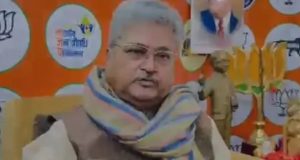DAINIK NATION BUREAU : In a significant legal development, the Gujarat High Court has recently declined to grant a stay on the conviction of Rahul Gandhi, a prominent Indian politician, in a defamation case. The decision has garnered attention across the nation, fueling discussions about freedom of speech, political accountability, and the role of the judiciary. This article aims to shed light on the details of the case, the court’s ruling, and its potential implications for the Indian political landscape.
Background of the Case : The case pertains to a defamation complaint filed by a Bharatiya Janata Party (BJP) member, who accused Rahul Gandhi of making derogatory remarks against BJP leaders during a 2016 election rally in Gujarat. The complainant alleged that Gandhi’s statements had tarnished the reputation of the BJP and its leaders. Subsequently, a trial court in Ahmedabad had found Rahul Gandhi guilty of defamation in 2019 and sentenced him to two years of imprisonment along with a fine.
Gujarat High Court’s Decision : Rahul Gandhi had filed an appeal before the Gujarat High Court seeking a stay on his conviction and imprisonment. However, the division bench of the High Court, comprising Justice Vipul Pancholi and Justice Bhargav Karia, refused to grant the requested relief. The court maintained that prima facie, there were no grounds to suspend the conviction. It further stated that Gandhi could not claim any special treatment solely because of his political stature. As a result, Rahul Gandhi will have to face the legal consequences of the defamation case, subject to any future appeal.
Implications and Significance : The Gujarat High Court’s decision not to stay Rahul Gandhi’s conviction holds significant implications for both the political and legal realms in India. Firstly, it underscores the principle of equality before the law, emphasizing that no individual, regardless of their political influence, can expect preferential treatment when facing legal consequences.
Secondly, this ruling serves as a reminder to politicians and public figures that their words and actions carry weight and should be exercised with caution. Freedom of speech is a fundamental right, but it comes with a responsibility to ensure that one’s statements do not infringe upon the rights and reputations of others.
Thirdly, this case highlights the importance of an independent judiciary in upholding the rule of law. The court’s refusal to grant a stay on Rahul Gandhi’s conviction demonstrates the judiciary’s commitment to impartiality and fairness, bolstering public trust in the legal system.
Moreover, this verdict may have ramifications for Rahul Gandhi’s political career and the Indian National Congress party. While the immediate consequence is his impending imprisonment, the conviction could have a broader impact on his reputation and political standing, potentially influencing public perception and electoral outcomes.
The Gujarat High Court’s decision to reject the stay on Rahul Gandhi’s conviction in the defamation case serves as a significant development in the Indian political landscape. The ruling emphasizes the importance of equality before the law and underscores the responsibility of public figures to exercise their freedom of speech judiciously. Moreover, it reinforces the crucial role of an independent judiciary in upholding the rule of law and maintaining public trust. As the case progresses, it will be interesting to observe its broader implications for Rahul Gandhi, the Indian National Congress, and the political discourse in the country.
 Dainik Nation News Portal
Dainik Nation News Portal




